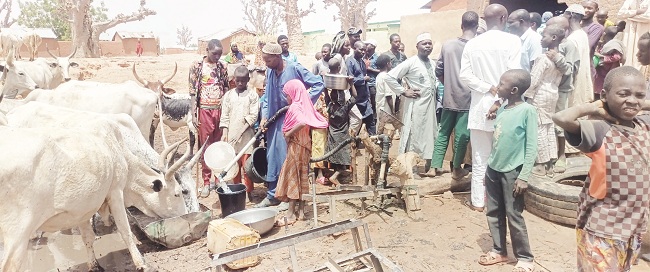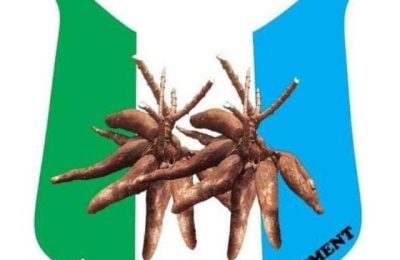Gabchiyari is a hard-to-reach community in Bauchi State where about 200,000 residents suffer water shortages and poor road networks are taking a toll on education and the general livelihood of the people, Ishola Michael writes.
Gabchiyari is a hard-to-reach community in Darazo Local Government Area of Bauchi State. Though it is 25km away from Darazo, the headquarters of the local government, it takes not less than three hours to access due to the nature of the only road to the village, a political ward headquarters in the LGA.
According to the population census, the area has at least 200,000 people; the dominant tribe is Kanuri, and there are Fulani settlements. The inhabitants are predominantly farmers and cattle rearers. They cohabit peacefully, considering that a large percentage of the population are Muslims with a handful of Christians and traditional worshippers.

Though the people are living happily together, their suffering has gone unnoticed. Despite their cries for help over the years, their story has remained the same.
Residents of the area are in dire need of potable water for domestic and other uses. It is a pathetic sight to behold people and animals waiting in turns to have water to drink in order to keep life going.
As the world celebrated World Water Day in 2023, the community groaned over their lack of water.

The community is also in need of other social amenities to make the environment more habitable and to give their children a chance to reach their full potential in life through quality education and improved healthcare services.

Recently, the Nigerian Tribune took a tortuous journey with the Bauchi Field Office of UNICEF to the community to see how the people are coping with existence.
The journey from Darazo to Gabchiyari was a smooth one for the first 10km because there is a road being constructed by the Federal Government.
However, for many years now, work has stopped on the road, a development that has dashed the hopes of the people of the communities who longed for easy accessibility to them. It was, therefore, not an easy ride to the village as the bus got stuck in the sand on three occasions before arriving at the destination.
The first sight one meets on entering Gabchiyari is a borehole that supplies water to both humans and animals, who take turns to be served. A payment of the sum of N200 per drum (250 litres) is required.
Going around the village, the major sources of water for both domestic and other uses, including animals, are wells that are at least 250 metres deep and are difficult to draw water from due to the depth. The situation has brought a lot of untold hardship to the people, but they have little choice.
A cry for help was made to the Bauchi State government, international development partners and other well-meaning citizens of the state as well as the local government area by residents of Gabchiyari community when a select group of journalists met them on Thursday, March 16, preparatory to the commemoration of World Water Day. The day is set aside by the UN every March 22 to highlight issues around water globally.
The district head of Gabchiyari community, Mallam Muhammad Garba, while addressing the journalists, bemoaned that man-hours were being wasted by people from the surrounding hamlets while queuing for water at the boreholes.
“Our community is a hard-to-reach area whose water challenges are being compounded by the absence of good roads. People from surrounding hamlets travel between three to five kilometres to access potable water. So, you can imagine the productive hours wasted trying to look for water.
“Ordinarily, it will take about 20 minutes to get to Gabchiyari from our LG headquarters, but due to the absence of a feeder road, it will now take an average of two hours to get here; that is, if the vehicle does not get stuck in the sand dunes that dot our terrain. It is even worse during the rainy season,” he lamented.
He lamented that the situation has negatively affected education in the area as children must first walk distances to get water for use before going to school later in the day. They end up stressed and exhausted, and absorb little in school.
The traditional ruler also said that the lack of an adequate source of water had a negative impact healthcare services as the only PHC in the area lacks water to function. It was learnt that the community contributes money in order to buy water for the facility.
Mallam Garba then appealed to the Bauchi State government and other stakeholders to see how water as well as access roads could be made available to them to ease the transportation of their farm produce and also attract development for the community.
While speaking on how the lack of sufficient water affects other critical areas of human development, the Ward Community Development (WDC) chairman of Gabchiyari, Aliyu Alhaji, said that the lack of water is also negatively affecting school enrollment and retention.
This is because, according to him, the children spend school hours looking for water and thereby miss classes or, in some instances, abandon education altogether.
According to the him, for the children who made the effort to fetch water and still attend school, “you discover that they attend classes late and are usually too fatigued to comprehend any meaningful exercise in class.”
A politician from the area who served as a three-time councillor for the ward, Suleiman Gabchiyari, lamented that the people were suffering because of the lack of sustainable sources of water, making life unbearable for them, especially in the dry season.
He claimed that he had made effort to do something about the situation for the people, but his efforts did not yield positive results.
“There was an occasion I had a personal discussion with the former governor of Bauchi State, Malam Isa Yuguda. He promised to do something about our situation, but nothing positive happened,” he said.
He alleged that the immediate past governor of the state, Mohammed Abdullahi Abubakar, promised to come to the aid of the community but could not do anything before his tenure ended.
Gabchiyari, however, expressed the hope that in no distant future, the problem will become a thing of the past, particularly with the visit of the team of journalists which would highlight their suffering to the outside world.
One of the Fulani cattle rearers, Abdu Jodi, lamented that rearers like him pay money every day to get water for their cattle.
A girl-child, Jummai Habu, and her friends must first fetch water and fill up the available containers in the house before going to school every day. This has made it very difficult for her and her friends to cope at school.
But all hope is not lost as disclosed by the Darazo LGA Water, Sanitation and Hygiene (WASH) Coordinator, Ibrahim Mohammed Hassan.
While speaking with journalists, he said that the Bauchi State government has mainstreamed the local government into a WASH project under the African Development Bank (ADB) intervention signed by the state government.
The WASH coordinator was quick to add that the only water scheme that will be productive in Gabchiyari community would be a motorised or solar-powered borehole considering the terrain of the area.
“It takes a minimum of 90 feet before we could hit water level here. This is because of the topography of the area. So, you can see that a hand pump borehole will not serve the purpose here,” Hassan said.








